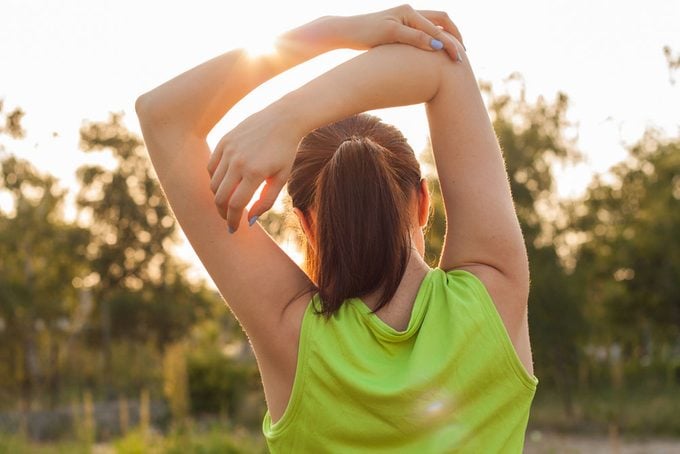5 Reasons To Exercise (It Has Nothing To Do With Flat Abs or Weight Loss!)
Move like your life depends on it.
 Whether you prefer to walk, run or spin, it doesn’t matter so long as you move, says Jennifer Brunet, an assistant professor at the School of Human Kinetics at the University of Ottawa. “Physical activity is any type of movement you do with your body, and it can be as simple as walking to the store instead of taking the car,” she says. “Thinking of it that way opens more doors for people – it means you can pick any activity you enjoy and just do it.”
Whether you prefer to walk, run or spin, it doesn’t matter so long as you move, says Jennifer Brunet, an assistant professor at the School of Human Kinetics at the University of Ottawa. “Physical activity is any type of movement you do with your body, and it can be as simple as walking to the store instead of taking the car,” she says. “Thinking of it that way opens more doors for people – it means you can pick any activity you enjoy and just do it.”
It also helps if you can consciously shift your focus away from losing weight and think more about having fun, she says. The Canadian Physical Activity Guidelines say the magic (minimum) number of active minutes you need each week to improve your health is 150. “But I always tell people ‘Do a bit more than you did last week and focus on enjoying it,'” says Brunet. “Getting on an elliptical for 45 minutes may not provide the same experience as going for a jog outside on a beautiful sunny day. If it’s just work – and all about weight management – it doesn’t have the same impact.”
Yes, weight management is an important health outcome of physical activity, but Brunet says the problem is that most people decide to exercise solely because they want to lose five or 10 pounds, and that can actually sabotage their efforts in the end. “We need to shift the focus away from weight because often when people don’t see the physical changes they want right away, they give up and stop exercising,” she says.
Then there are all the unseen benefits of being active. It’s a safe bet that physical activity could be the most powerful tool we have for the health of all the systems in our bodies, says Mary Jung, an assistant professor and director of the Health and Exercise Psychology Lab at the University of British Columbia. “Whether it’s lowering blood pressure and regulating blood glucose levels or improving mood and contributing to social well-being, these are all things you can’t measure on a scale,” she says. “I don’t know of any drug that can capture all of them at the same time and there are no negative side effects.”
Brunet says the key is to change the way you think about exercise and set goals based on some of its other health benefits, like getting more sleep or shutting down stress. “It also helps to focus on how you feel after you’re active,” she says. “Just like diet, physical activity has to be sustainable. If you make it fun and feasible, it will help you improve both the quality and length of your life.” Here are five pretty compelling (non-weight-loss-related) reasons to get out there and move more.
1. Exercise to… Sleep More
There’s plenty of research to suggest that physical activity leads to better sleep, says Brunet, though scientists aren’t exactly sure why. “We just know that it has a positive impact overall and can help you fall asleep faster and ensure that you sleep longer,” she says. It could be because exercise raises your body temperature (and the post-workout drop promotes sleep), or it may have something to do with a shift in your circadian rhythm (the body’s internal sleep clock). Or it could simply be because exercise reduces anxiety and arousal, making it easier for you to drift off worry-free.
Try: 6 Soothing Yoga Poses to Help You Sleep
On the flip side of things, there is also evidence that sleep has a positive impact on exercise: A 2013 study in the Journal of Clinical Sleep Medicine found that the more good-quality rest you get at night, the more likely you are to exercise the next day.
2. Exercise to… Move Well
About one in three people over the age of 65 falls each year, which is why you need to engage in functional physical activity, no matter what your age, to improve balance, mobility and joint health, says David Westwood, head of kinesiology at Dalhousie University in Halifax.
Last year, French researchers studied 706 women aged 75 to 85 years old and found that those who stuck with a two-year exercise program to improve their balance cut their risk of being injured in a fall by about 20 percent. They also did better on walking and balance tests overall and rated their quality of life higher at the end of the study than those who weren’t in the program.
Range-of-motion exercises, such as yoga and tai chi, increase the amount of movement in your joints and muscles and are also good for balance and flexibility. (To keep limber, take a few minutes every morning to move your joints through their full range of motion with wrist, ankle, knee and shoulder circles in both directions.)
3. Exercise to… Think Better
One of the most recent developments in the connection between exercise and overall health is its discovered link to alertness, mental performance and creativity, says Westwood. He points to the rise in standing desks and walking meetings, as corporations use the results of the latest scientific findings on exercise to enhance their employees’ brainpower. “It’s as simple as putting on a pair of shoes and going for a walk,” says Westwood. “It’s low-cost and accessible.”
Even just standing versus sitting can help you think more clearly. “When you stand and resist gravity, it perks up the rest of your brain,” says Westwood. “The reticular activating system in your brain stem [also responsible for posture and balance] kicks in and alerts your cerebral cortex. It’s basically an evolutionary function: When you were once up and moving around, you were either tracking prey or trying to avoid becoming prey yourself, so you were automatically at an increased level of attention and mental alertness.”
In 2014, researchers at Stanford University studied 176 college students and found that walking – indoors or out – increases creative output by an average of 60 percent. Meanwhile, in March, a study in the journal Neurology revealed that older adults who regularly engage in moderate to intense exercise stay sharper and have a slower rate of decline in cognitive skills than those who don’t. In fact, sedentary seniors showed an extra 10 years of brain aging than their more active counterparts.
4. Exercise to… Have Better Sex
About 80 percent of women report being dissatisfied with their physical appearance, says Brunet. When you exercise, you feel better about your body, and that can work to your advantage in the bedroom. “In our research, we found that women report improved body image and feel more comfortable with their partners after physical activity,” she says. “With increased feelings of physical self-worth and self-esteem, some women said they felt more comfortable when they were undressed and their intimate relationships also improved.”
Try: 31 Natural Libido Boosters for Better Sex
Then there’s the age-old question: Does sex count as exercise? According to a 2013 study from the University of Quebec, the answer is yes. Researchers found that energy expenditure during sexual activity is about 85 kilocalories, and (surprise!) participants report that having sex is more appreciated and enjoyable than spending 30 minutes on a treadmill.
5. Exercise to… De-Stress
Physical activity is one of the best things you can do to manage stress, says Brunet, and it can be anything from a quick walk in the park (in 2014, researchers at the University of Michigan found that group nature walks reduced depression, improved well-being and mental health and lowered perceived stress) to a full-out, high-intensity, sweat-inducing workout.
Exercise is a distraction and a way of coping, says Brunet. Its positive effects may also have something to do with the body’s physiological response. “Exercise increases feel-good endorphins and other helpful anti-stress hormones,” adds Brunet. In February, researchers at UC Davis Medical Center discovered that exercise increases levels of the neurotransmitters glutamate and GABA, both of which are depleted in the brains of patients with depression and anxiety. “Physical activity reduces depressive symptoms, such as lack of energy and feelings of hopelessness, and improves overall mental health,” says Brunet.
Some studies have shown that exercise can be as effective as a treatment for depression as drugs and cognitive behavioural therapy. “If you take medicine to treat depressive symptoms, it’s not necessarily going to make you a happy, healthy, striving individual,” says Brunet, “but physical activity has the ability to do all of that and more.”




